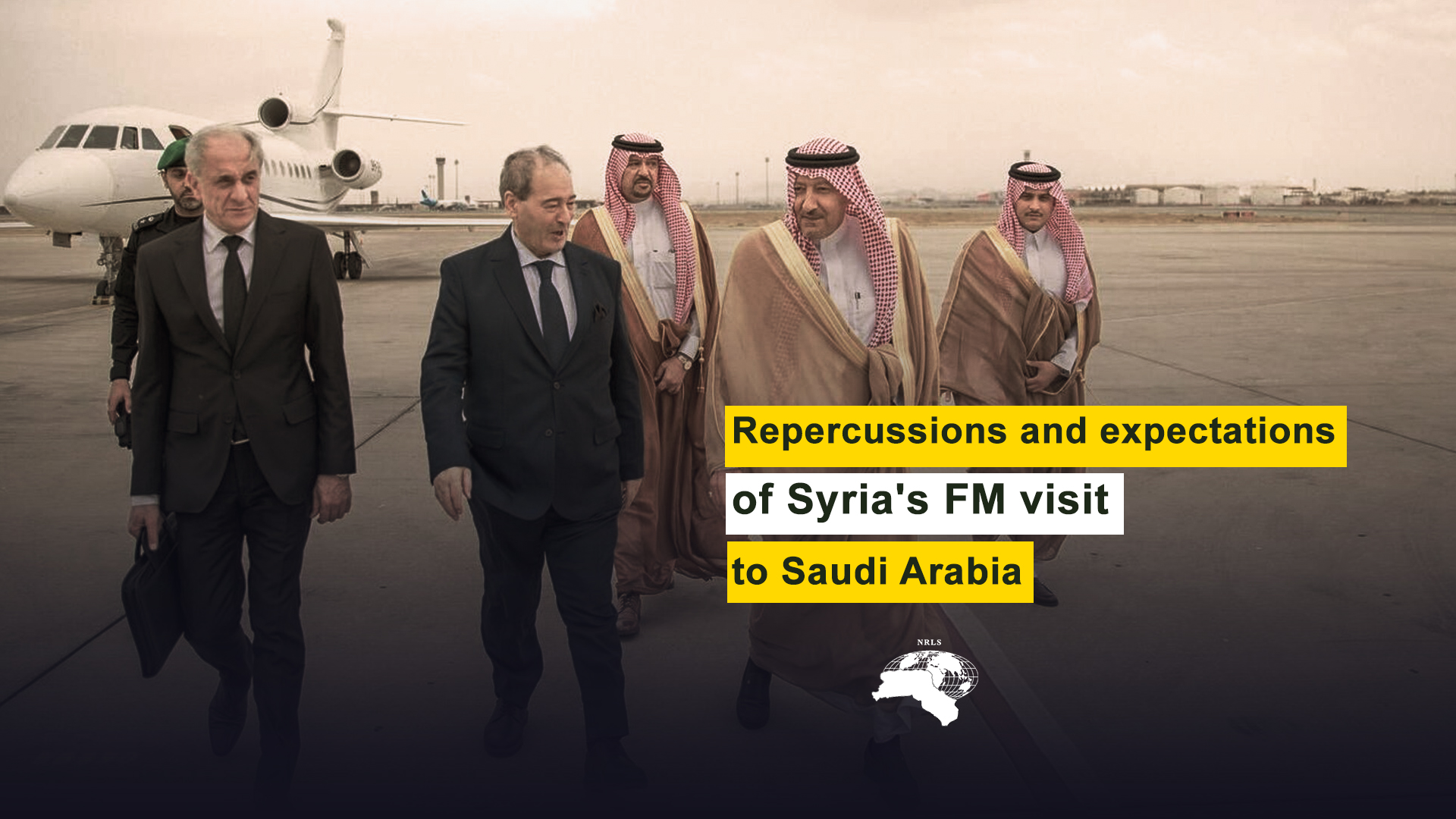Repercussions and expectations of Syria’s FM visit to Saudi Arabia

Faisal Mekdad, Syrian Foreign Minister, arrived last week in Jeddah, on his first official visit to Saudi Arabia, at the invitation of Saudi Foreign Minister Faisal bin Farhan, after a break between the two countries that lasted for more than a decade due to the Syrian crisis and Saudi Arabia’s support for the Syrian opposition and the suspension of the latter’s membership from the Arab League since 2012. However, many developments and changes took place in the Middle East against the background of the Russian-Ukrainian war, the Saudi-Iranian agreement under Chinese auspices, the frequent meetings of the two sides in Beijing, the Chinese capital, and the entry of China itself into a new movement in the Middle East to formulate a new type of relations that leads to calm and defuse many files. It also creates a new regional movement that predicts the emergence of a new global pole with the beginning of the rapprochement of the Russian and Chinese giants, and cooperation in secret on a strategic level that has not been officially announced so that China try to play its role in ending the Russian-Ukrainian war.
China concluded a number of strategic agreements with Saudi Arabia and the countries of the Gulf Cooperation Council (GCC) that allowed regional countries to work in the same path, such as the Omani, Emirati and Iraqi mediations that fall within the context of these regional changes that played their role in creating the conditions for this Syrian visit to Saudi Arabia, in addition to Russian attempts to achieve Syrian-Turkish rapprochement through Bashar al-Assad’s visit to Moscow and the completion of the quadrilateral meeting between the Russian, Turkish, Iranian and Syrian deputy foreign ministers, which despite its obstacles, is still in progress and in labor because of the Syrian regime’s condition for the Turkish withdrawal from northern Syria and the abandonment of Turkey’s support for the Syrian armed opposition factions. In the midst of these international and regional conditions and changes came this official Syrian visit to the Kingdom of Saudi Arabia, especially after the catastrophe of the earthquake that struck both Syria and Turkey and the international and regional openness to Syria in terms of humanitarian assistance and the increasing landing of international and Arab relief planes at Damascus International Airport and the lifting of international sanctions on Syria for a period of six months and the increasing pace of the Arab move towards Damascus to float Bashar al-Assad and attempts to return Syria to the Arab League. The start was with the Sultanate of Oman, the United Arab Emirates, the visit of the Jordanian Foreign Minister, and the conference of Arab parliaments that was held in Baghdad in the presence of the Syrian parliamentary delegation and then their visit to Damascus, and the visit of the Egyptian Foreign Minister Sameh Shukri to Damascus. All this regional atmosphere led to this Syrian visit to Jeddah. The aim of the visit, as announced by him, was to exert efforts to reach a political solution to the Syrian crisis, to preserve the territorial integrity of Syria, to facilitate the return of Syrian refugees, and to facilitate the arrival of aid to the affected areas.
There is also talk about inviting the Syrian President to attend the Arab Summit to be held in Riyadh, next May. It is noticeable that most Arab countries are seeking to restore relations with Syria under the regime of Bashar al-Assad, except for Qatar, which announced that its position has not changed and is subject to Arab consensus as it is. It depends on achieving real changes in the Syrian reality. The Moroccan and Kuwaiti positions are similar to the Qatari one and are consistent with the American and European positions that refuse normalization with the Syrian regime unless the implementation of UN Resolution 2254 is achieved to put an end to the Syrian crisis.
Whatever the matter is about the Syrian situation, and until its return to the Arab League and even if the Arab isolation is broken, the Syrian regime will likely not recover, nor will it return to what it was before 2011 before the outbreak of the Syrian crisis. Russia is present on the coast and in western Syria, and Iran is present and infiltrated in most of the Syrian cities, their bases and factions are spread as far as Deir ez-Zor and Abu Kamal, and they are exposed almost daily to Israeli raids. The Syrian process is in a difficult state of labor and awaits a real settlement compatible with international and UN resolution 2254. What is happening from Iranian attacks on some American sites are only temporary quarrels that do not bear fruit, as happened a few days ago. On the other hand what will be achieved for the Syrian people and its communities who lost hundreds of thousands of victims and millions of displaced people in Europe, Turkey, Lebanon, and other neighboring countries and in the world, and what about their lands that were occupied and subjected to cultural, demographic and human change in Idlib, Afrin, northern Aleppo, Tel Abyad, Ras al-Ain, and others. Also, what about the east of the Euphrates and the Democratic Autonomous Administration in northeastern Syria, where is it from all that is happening regionally and internationally. It must strengthen Kurdish diplomacy locally, regionally, and internationally, mobilize the Arab and international street, make a positive breach in relations, and play on the available cards to achieve the national goals of all communities in northeastern Syria.




